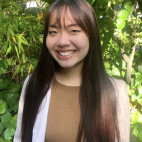Meet the GGSC’s New Fellows for 2022-2023
August 17, 2022
The Greater Good Science Center is proud to present its 2023-24 class of distinguished Research Fellows, which includes excellent UC Berkeley students from the fields of psychology, urban studies, social welfare, integrative biology, and beyond. They are an outstanding group of young researchers who are committed to the greater good.
The GGSC’s annual fellowship program supports the work of UC Berkeley students whose research advances the science of compassion, empathy, and other topics we explore. The program attracts scholars from across a broad spectrum of academic disciplines, with a particular focus on the social-behavioral sciences.
This year, our fellows tackle subjects ranging from how loneliness affects dementia risk to how perspective taking might increase support for criminal justice reform. Please read on for more details about our newest fellows, and visit our fellowships page for more details about the program and summaries of past graduate and undergraduate fellows’ work.
2023-2024 Graduate Fellows

Douglas EppsSocial-Personality Psychology
Douglas Epps is a doctoral candidate at UC Berkeley’s School of Social Welfare. Before coming to Cal, he earned a dual B.A. in psychology and social welfare, as well as an M.S.W. from the University of Washington. His research explores action-oriented solutions to address harms associated with the rise of punitive approaches to managing migration, such as the use of human confinement. As a GGSC fellow, Douglas’s study will focus on the American electorate as a key mechanism of policy change to engender more humane treatment of disenfranchised populations. More specifically, he will conduct a nationwide survey experiment to test the utility of a novel communication strategy emphasizing cross-racial and class solidarity, along with shared economic self-interest, to mobilize support for harm-reductive, community-based alternatives to immigration detention.

Cathy HuSocial Welfare
Cathy Hu is a fourth-year Ph.D. student in sociology at UC Berkeley. Prior to coming to Berkeley, she received her B.A. in sociology from Rice University and worked as a research analyst at the Urban Institute’s Justice Policy Center. Her current work sits at the intersection of punishment and society and social movements. As a GGSC fellow, Cathy is conducting an ethnographic and interview study of the criminal court as a new site of activism. Specifically, she explores grassroots efforts to bring an alternative vision of justice into the courts, which replaces carceral violence with relational healing and social well-being.

Sophie ReganIntegrative Biology
Sophie Regan is a second-year Ph.D. student in the Psychology Department at UC Berkeley. She received a B.S. in symbolic systems, a B.A. in French, and an M.S. in symbolic systems from Stanford University. Her research focuses on language development. As a GGSC fellow, Sophie will explore how young children learn to articulate their emotions and how their language skills relate to their self-regulation abilities. The goal of this research is to empower teachers to use evidence-based approaches in their preschool classrooms.

Tyrone SgambatiSchool Psychology
Tyrone Sgambati is a fourth-year doctoral student in the Psychology Department at UC Berkeley. Before coming to Berkeley, he received his B.S. in psychology, cognitive science, and philosophy at the University of Michigan. Currently, his research focuses on three areas: ameliorating political polarization, understanding the link between psychedelics and well-being, and improving emotion regulation. As a GGSC graduate fellow, Tyrone will investigate how the trait intellectual humility is related to political polarization on Twitter. Specifically, he will examine cross-party interaction dynamics, political social network composition, and emotional responses to political stressors in high– (vs. low–) intellectual humility Twitter users.

Nirupika SharmPublic Policy
Nirupika Sharma is a second-year doctoral student in UC Berkeley’s social-personality psychology program. She received her B.A. in psychology from New York University in 2013. Her research focuses on the effects of identity on perceptions of the self (i.e., authenticity) and intra- and inter-group relationships. As a GGSC fellow, Nirupika will explore the implications of acting white, a form of code-switching, on (1) felt authenticity and (2) feelings of shared reality with intra- and inter-group members, both of which are vital to harmonious social connections. With this in mind, Nirupika will investigate potential ways to buffer against the negative consequences of acting white. This research strives to facilitate greater concordance between feeling authentic and meeting relational needs to ultimately improve social dynamics.
2023-2024 Undergraduate Fellows

Linda Kawamoto Data Science
Linda Kawamoto is a fourth-year international student from Japan majoring in psychology. She works with Professor Clayton Critcher at the Haas School of Business. Her research investigates how group size affects the level of the involuntary excluder effect (IEE), where a socially excluded person sees included persons as though they are actively excluding them. Her project will measure the robustness of the IEE by systematically varying the number of included and excluded members. It will also test the mechanism of IEE by measuring how one’s role as an included or rejected person changes one’s construal of the ambiguous exclusion. Overall, she hopes that her research will contribute to societal well-being by tackling ambiguous social exclusion.

Christina LiUrban Studies
Christina Li is a fourth-year psychology major at UC Berkeley, and she is interested in the psychological underpinnings of power, privilege, and inequality. Her current project investigates a phenomenon known as “power projection,” which was documented by Professor Arman Catterson and shows that a person’s power and status are positively related to their perception of another person’s power and status. The study focuses on how people’s self-perceptions of power influence the way they perceive others’ power in ways that might influence prosocial behavior. Christina’s research aims to advocate and help implement effective mental health policies and resources for marginalized communities.